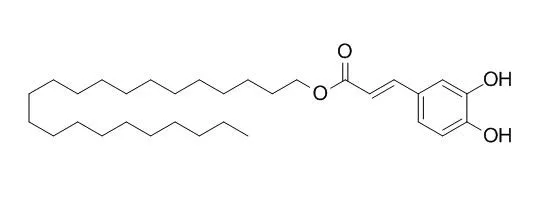| In vivo: |
| Academic Journal of Second Military Medical University, 2008,28(10):1221-6. | | Anti-inflammatory constituents from the stems of Daphne genkwa.[Reference: WebLink] |
To study the anti-inflammation contents in the stems of Daphne genkwa.
METHODS AND RESULTS:
The anti-inflammation contents were obtained from Daphne genkwa by bio-assay guide isolating method. The pharmacological model of dimethylbenzene-induced ear swelling was used for pharmacological study. The fractions of Ligroine and chloroform part of the the EtOH extraction were isolated and purified by column chromatography on silica gel and Sephadex LH-20 and recrystallization. Their structures were studied by using UV, IR,1 H-NMR,13 C-NMR, and MS, techniques. Nineteen compounds were isolated from the stems of Daphne genkwa and were identified as 2, 3-dihydroxypropyl hexadecoate(1), β-sitosterol(2), dueicosanyl caffeate(3), Docosyl caffeate(4), octadecyl caffeate(5), daucosterol(6), genkwanin(7), luteolin(8), (+) lariciresinol (9), apigenin (10), kaempferol (11), daphnodorin B (12), genistein (13), dihydrokaempferol (14), p-hydroxybenzonic acid (15), quercetin (16), syringin (17), syringaldehyde (18), ethyl 4-hydroxybenzoate (19).
CONCLUSIONS:
Compounds 1, 3-5, 7, 15, 17-19 have been isolated from the stems of Daphne genkwa for the first time. The high dosage of petroleum ether extract, chloroform extract and compound 4 have significant anti-inflammation activity in mice with ear swelling. |
|






 Cell. 2018 Jan 11;172(1-2):249-261.e12. doi: 10.1016/j.cell.2017.12.019.IF=36.216(2019)
Cell. 2018 Jan 11;172(1-2):249-261.e12. doi: 10.1016/j.cell.2017.12.019.IF=36.216(2019) Cell Metab. 2020 Mar 3;31(3):534-548.e5. doi: 10.1016/j.cmet.2020.01.002.IF=22.415(2019)
Cell Metab. 2020 Mar 3;31(3):534-548.e5. doi: 10.1016/j.cmet.2020.01.002.IF=22.415(2019) Mol Cell. 2017 Nov 16;68(4):673-685.e6. doi: 10.1016/j.molcel.2017.10.022.IF=14.548(2019)
Mol Cell. 2017 Nov 16;68(4):673-685.e6. doi: 10.1016/j.molcel.2017.10.022.IF=14.548(2019)